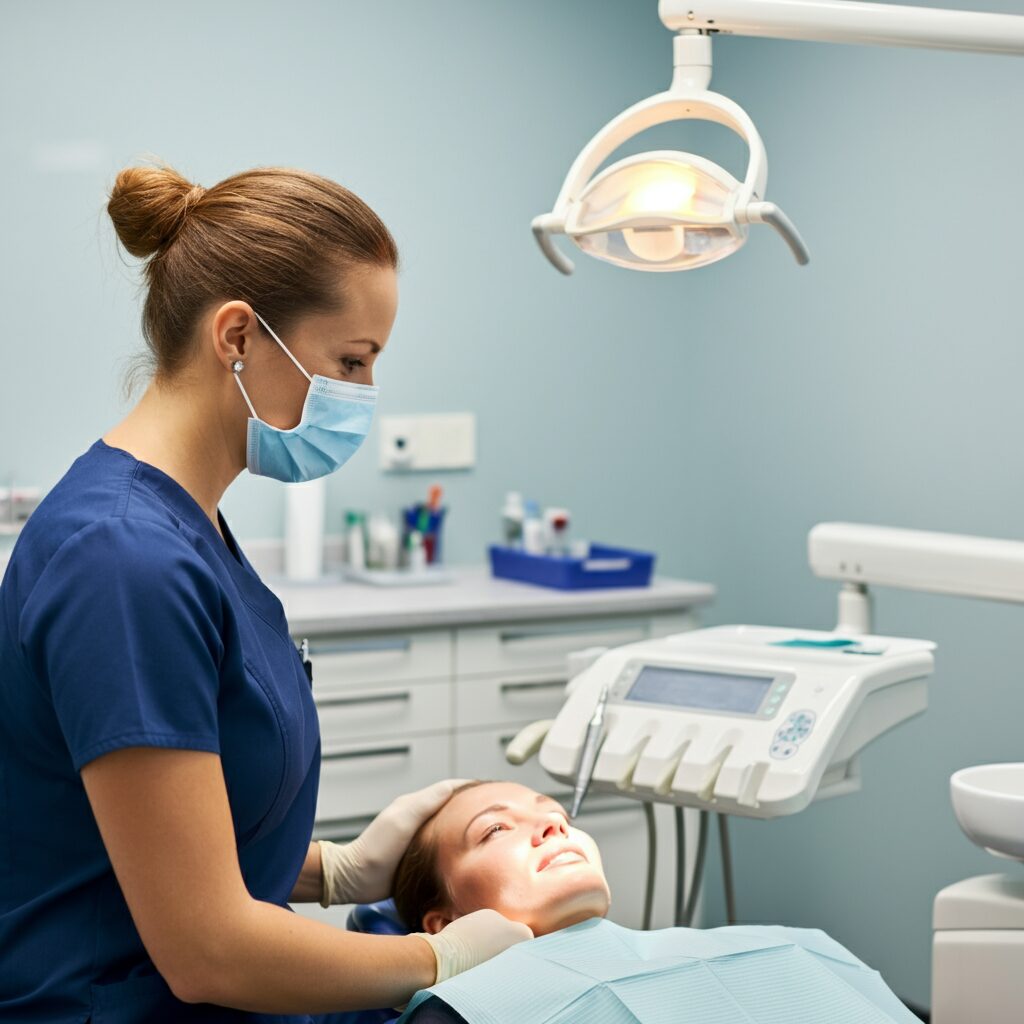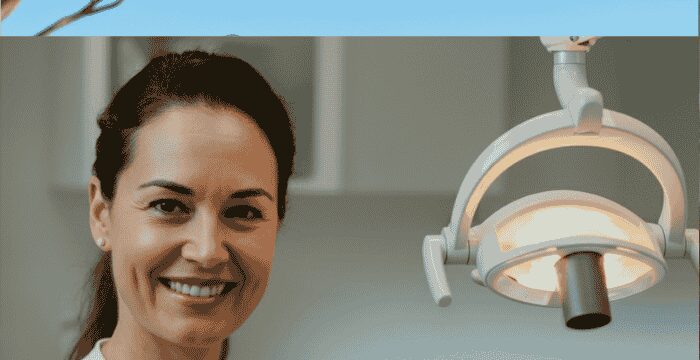The dentist salary in Australia structure brings great rewards and presents career opportunities beyond the national average salaries. In 2025, Australian dental workers make more money than most other professional healthcare providers because they earn between $120,000 and $250,000 annually. This comprehensive guide explores Australia’s latest dentist salary trends, factors influencing earnings, and strategies to maximize your income potential in this thriving profession.
Latest Facts About Dentist Salary in Australia (2025)
The dental profession continues to pay well in Australia at present because of these important wage numbers:
- Most Australian dentists earn between $190,000 and $250,000 annually as their professional rate.
- The Dentist salary in Australia per hour averages between $68.50 and $125
- Sydney has the highest dental practitioner pay in Australia, set at $273,770 per year or $132 per hour
- The highest-paid dental professionals, Oral and Maxillofacial Surgeons, make close to 377,954 USD per year.
- Beginner dentists usually earn between $80,000 and $120,000 in their first position.
- The dentistry business will expand by 8% over the next five years.
- Desirable dentists working in private settings make more than $200,000 each year of their career.
- The Level 4 public sector Dental Officers in Tasmania receive salaries that range from $204,590 to $216,775 under their contract.
- Dentists in South Australia make $151,362 per year based on new statistical information
Australian dental practices in rural areas pay less than those in urban centers nationwide. In 2025, Australian dental practitioners still earn substantially more than regular Australian workers, bringing in 57% more than the average worker.
Understanding Average Dentist Salary in Australia 2025
The profession offers high earnings because Australia needs many dental professionals to perform their specialized work. According to updated industry data, dentists at general practice rank earn $120,000 to $200,000 as their annual income. The large salary shows how much it costs to become a dentist due to their essential responsibility and demanding work.
| Experience Level | Annual Salary Range | Monthly Salary Range | Hourly Rate Range |
| Entry-level (0-1 years) | $80,000 – $120,000 | $6,667 – $10,000 | $38 – $58 |
| Early career (1-4 years) | $100,000 – $150,000 | $8,333 – $12,500 | $48 – $72 |
| Mid-career (5-9 years) | $120,000 – $180,000 | $10,000 – $15,000 | $58 – $87 |
| Experienced (10+ years) | $180,000 – $250,000+ | $15,000 – $20,833+ | $87 – $120+ |
Doctors’ average salaries in Australia depend on many aspects, such as their dental specialization, geographic area, practice type, and long-term experience. Dental professionals gain multiple income opportunities through their career path choices and work focus.
Latest Factors Influencing Dentist Salary in Australia 2025
Multiple factors decide what a dental professional can earn in Australia. Knowing these aspects will assist dental professionals in reaching their highest career earnings.
Dentist Salary in Australia By Experience Level
An Australian dentist receives a higher salary based on their professional years worked. New dental professionals take home $92,247 annually, while experienced dentists with 1 to 4 years bring in $102,293 annually. The more years of practice a dentist has, the higher their professional earnings can become.
- Entry-level (0-1 years): $80,000-$120,000
- Early career (1-4 years): $102,293 average
- Mid-career (5-9 years): $120,000-$180,000
- Experienced (10+ years): $180,000-$250,000+
The dental profession recognises experience through clear earning increases, showing professionals how to advance their careers and boost their pay as dental practitioners in Australia.
Dentist Salary in Australia By Geographic Location
Your income as a dentist depends heavily on the location in Australia where you practice. In Sydney, Melbourne, and Brisbane, you’ll earn the most since these metropolitan regions have high dental service demands and expensive living costs. Rural dental jobs pay less starting pay while offering additional compensation arrangements.
| City/Region | Average Annual Salary | Average Hourly Rate |
| Sydney | $273,770 | $132 |
| Melbourne | $261,916 | $126 |
| Darwin | $242,074 | $117 |
| Adelaide | $241,727 | $117 |
| Brisbane | $234,263 | $113 |
| Perth | $203,000 | $98 |
| Hobart | $153,000 | $74 |
| Rural Areas | $120,000–$180,000 | $58–$87 |
Australia’s geographical dental salary differences help dentists make better career choices between lifestyles and income targets.
Dentist Salary in Australia By Specialization
Specialised dentists receive much higher earnings than regular dental practitioners. Medical professionals who further their education receive higher salaries compared to general practitioner,s as shown in the orthodontist salary analysis.
| Dental Specialty | Average Annual Salary | Average Hourly Rate |
| Oral and Maxillofacial Surgeon | $377,954 | $183 |
| Prosthodontist | $299,876 | $144 |
| Endodontist | $289,150 | $139 |
| Periodontist | $284,000 | $137 |
| Oral and Maxillofacial Pathologist | $202,700 | $104 |
| Orthodontist | $200,041 | $103 |
| Dental Anesthesiologist | $200,000 | $130 |
| Pediatric Dentist | $199,562 | $97 |
| General Dentist | $120,000 – $200,000 | $58 – $96 |
Professionals in dental specialities need more training and education than regular dentists, which targets their practice growth opportunities and increases their Australian earnings.
Dentist Salary in Australia By Practice Type
Practising in a certain field directly changes the amount dentists earn in Australia.
Private Practice Earnings
Private practice dentists usually make more money than their public sector peers, and skilled practitioners can collect over 200,000 annually. Dental professionals with higher incomes are responsible for managing their business operations and may experience less job stability.
Private practice benefits dental practitioners of Australia by providing better ways to boost their financial success.
- Higher earning potential, especially for practice owners
- Greater autonomy in clinical decision-making
- Dentists can establish their employment times and workplace standards.
- You can create business ownership assets in a private venture
Latest Public Sector Dentist Salary in Australia 2025
Civil service dental professionals follow set pay ranges. For example, in Tasmania’s public dental service:
| Position Level | Salary Range |
| Level 1 dentists | $129,130 – $141,261 |
| Level 2 dentists | $147,835 – $153,814 |
| Level 3 dentists | $157,419 – $202,386 |
| Level 4 dentists | $204,590 – $216,775 |
| Level 6 dentists | $234,990 – $237,227 |
Public sector employees commonly benefit from these benefits in their job roles.
- Better job security
- More predictable working hours
- Comprehensive benefits packages
- Less business management responsibility
- Potential loan forgiveness programs
Dentist Salary in Australia Per Hour in 2025
Dentist salaries in Australia vary based on where they work, their years of service, and the training areas. The average dentist earns between $68.50 and $125 per hour, yet this figure differs widely from one major city to another.
| City/Region | Average Annual Salary | Average Hourly Rate |
| Sydney | $273,770 | $132 |
| Melbourne | $261,916 | $126 |
| Darwin | $242,074 | $117 |
| Adelaide | $241,727 | $117 |
| Brisbane | $234,263 | $113 |
| Perth | $203,000 | $98 |
| Hobart | $153,000 | $74 |
| Rural Areas | $120,000–$180,000 | $58–$87 |
Australians set their dentists’ pay as high because these service rates help dental professionals earn good full- or part-time hours. Part-time dentists in Australia can design their schedules based on the one-hour dental salary rates, which still bring them good financial returns.
Dentist Salary in Australia Per Month in 2025
Dentist salary in Australia per month typically ranges between $10,000 and $20,000+ before tax, depending on experience, location, and specialisation. Doctors receive good financial stability and lifestyle benefits because of their monthly earnings in dental work.
| Experience Level | Monthly Salary Range (Before Tax) |
| Entry-level | $6,667 – $10,000 |
| Early career | $8,333 – $12,500 |
| Mid-career | $10,000 – $15,000 |
| Experienced | $15,000 – $20,833+ |
| Specialists | $16,667 – $31,500+ |
These monthly figures translate to an annual average dentist salary in Australia of between $120,000 and $250,000, positioning dentistry among the highest-paid professions in the country.
Regional Variations in Dentist Salary Across Australia
Dentist salaries differ from one end of Australia to the next based on region, since everyday costs and dental demand differ between states.
Dentist Salary in Australia State-by-State Salary Comparison
Dentists in Australia receive these annual salaries depending on their state or territory’s location.
| State/Territory | Average Annual Salary |
| New South Wales | $225,000 |
| Western Australia | $225,000 |
| South Australia | $200,000 |
| Tasmania | $197,061 |
| Northern Territory | $190,000 |
| Victoria | $170,000 |
| Queensland | $160,000 |
| Australian Capital Territory | $152,000 |
South Australian dentists pay $151,362 per year, matching what doctors earn nationally. Public sector dental officers at Level 4 in Tasmania receive between $204,590 and $216,775, matching salaries in other parts of the country.
Dentist Salary in Australia: By Urban vs. Rural Salary Differences in 2025
The incomes of dentists practising in major cities stand much higher than in rural areas throughout Australia. Metropolitan areas have better base salaries, although rural practices usually offer additional benefits.
- Running a practice in rural areas helps owners limit practice costs
- Less competition and potentially more loyal patient bases
- The government gives financial help to dentists who practice in underdeveloped areas
- The reduced cost of living creates higher finances for spending, even with smaller yearly earnings.
To decide on their dental path, medical practitioners who examine rural practice must examine overall benefits based on base salary numbers. The employment package for Australian dental practitioners in rural locations will appear more lucrative over time since they receive extra income benefits beyond their starting salaries.
Career Progression and Salary Growth for Dentists in Australia 2025
Australian dentists earn substantial salary increases during their career path, and dental office owner salaries keep rising nationwide.
Dentist in Australia: By Experience-Based Salary Progression
The connection between years of dental experience and salaries in Australia produces an obvious upward movement in earnings.
| Career Stage | Years of Experience | Average Annual Salary | Key Milestones |
| New Graduate | 0-1 | $80,000 – $120,000 | Initial clinical skill development |
| Early Career | 1-4 | $102,293 – $150,000 | Building a patient base and reputation |
| Mid-Career | 5-9 | $120,000 – $180,000 | Potential partnership opportunities |
| Experienced | 10-19 | $180,000 – $250,000 | Practice ownership or senior roles |
| Senior | 20+ | $200,000 – $300,000+ | Leadership positions, mentoring |
The dental earnings path shows dentists can achieve greater income by putting their professional growth and patient network development in focus.
Latest Advancement Opportunities for Dentist Salary in Australia 2025
Boosting salary requires more than working years, since multiple pathways help dental professionals grow faster.
- Specialty training builds clinical knowledge,, raising salaries from 40% to 80% extra pay.
- A doctor who assumes ownership of a medical clinic earns about 30% to 50% more than regular practice income.
- Doctors who teach and do research, and clinical work, develop multiple cash sources.
- When you lead as a manager within larger dental practices or corporate dentistry, you will earn more money.
- Business leaders and dental organisations hire experienced medical experts to help with consulting projects while practising dentistry.
Various professional routes help Australian dental professionals expand their income throughout their employment.
How to Maximise Your Earnings as a Dentist in Australia 2025
Professional dental experts can use various methods to increase their dentist salary in Australia.
Continuing Education and Specialisation
Specialising and gaining qualifications enable dental practitioners to earn 80% more than basic dentist salaries. Taking further education improves your earning power while broadening the variety of services you can provide to patients.
Many dentists successfully earn more money when they focus their practice on these specialities, which provide good returns:
- Oral and Maxillofacial Surgery
- Prosthodontics
- Endodontics
- Periodontics
- Orthodontics
Exclusive training in these fields increases dental specialists’ salary levels as a reward.
Geographic Mobility
Medical professionals moving to high-demand urban zones or rural areas with government rewards will receive increased compensation. Dental professionals who accept work across different regions find opportunities to make more money when salaries vary and when they qualify for special employer rewards.
Strategic locations to consider include:
- Major metropolitan areas for the highest base salaries
- Affluent suburbs with demand for cosmetic and premium services
- Government incentives in underdeveloped rural regions provide opportunities for better dental practice incomes
- Growing regional centres with limited competition
The different dental workplace settings enable dentists to choose which settings will help them earn more in Australia.
Practice Ownership
Private practice ownership delivers the most funds but demands good business skills plus startup funds. Practice owners earn more money as clinic professionals and create business wealth simultaneously.
The financial benefits of practice ownership include:
- Direct profit from the practice beyond clinical salary
- Dental professionals can create value while acquiring a profitable business
- Tax savings benefit all business owners in their operations
- A business owner determines how much patients will pay and the range of services available
- The business can grow through combined service offerings from multiple dental professionals.
A dental practice owner earns more revenue than anyone else in their business in Australia.
Diversifying Income Streams
More forward-minded dentists add income sources to their dental profession beyond treating patients.
- The practice expands by teaching at dental programs or classrooms.
- Doctors work as consultants for both dental goods companies and medical practices
- Developing dental products or technologies
- The dentist develops online materials to help fellow dental practitioners learn.
- Investing in multiple practice locations
Having multiple sources of earnings helps improve dental professionals’ earning potential over time and protects their financial future.
How Australian Dentist Salaries Compare Globally? An International Comparison in 2025
The dentist salary in Australia ranks among the highest in the world, attracting dental professionals to the country.
| Country | Average Annual Dentist Salary (USD) |
| United States | $160,000 – $200,000 |
| Australia | $140,000 – $180,000 |
| Switzerland | $130,000 – $170,000 |
| Canada | $120,000 – $150,000 |
| Norway | $110,000 – $140,000 |
| United Kingdom | $80,000 – $120,000 |
| Germany | $70,000 – $110,000 |
| France | $65,000 – $100,000 |
| Japan | $60,000 – $90,000 |
| Brazil | $40,000 – $70,000 |
Strong healthcare standards, living conditions, and dental health importance in Australia produce high average dentist salaries relative to global competitors. High dental practitioner earnings and a good quality of life drive dental professionals from different nations to choose Australia for employment.
Future Outlook for Dentist Salary in Australia: Experts’ Insights 2025
The future of the practitioner dentist salary in Australia shows multiple positive market trends that will sustain high income numbers.
Growth Projections
Research shows that the dentistry industry will increase by 8% during the next five years, while salaries keep rising. The dental industry expands by 8% yearly due to these influencing aspects.
- Increasing awareness of oral health.
- More adults need dental services due to their increasing age.
- Growing demand for cosmetic dentistry procedures
- New technology develops alternative ways to treat patients
The Australian dental field will maintain strong salary growth trends until 2025 and offers opportunities for advancement in specialized areas in dental practices.
Emerging Trends for Dentists in Australia
The dental profession has several emerging patterns that create chances to boost earnings.
| The Use of Impact on Earnings | Description |
| Digital dentistry and CAD/CAM technology | Higher efficiency and new service offerings |
| Increasing focus on preventative care | Stable recurring revenue streams |
| Growing demand for cosmetic procedures | Higher-margin services with cash payment |
| Teledentistry and remote consultation | Expanded patient base and efficiency |
| Specialized services for aging populations | A growing demographic with specific needs |
According to these developments, the dentist salary in Australia trends will stay robust up to 2025, plus future growth is probable in specific medical field areas.
Challenges and Opportunities for Dentist Salary in Australia 2025
Although the future appears bright, dental professionals need to know about these upcoming challenges in their field.
- Increasing competition in metropolitan areas
- Growing corporate dentistry presence
- Insurance and payment model changes
- Higher expenses for dental students during their education
- Technological investment requirements
The dental business transformation brings difficulties but offers chances for dentists who know how to change their service to match marketplace demands. Professionals who adopt the latest technology skills and design effective practice systems will increase their dental practice income in Australia.
Employment Preferences Affect Earnings for Dentists Between Public and Private Healthcare in 2025
The choice between public and private practice significantly impacts dentists’ salaries in Australia, with distinct differences in compensation structures and career trajectories.
Public Sector Employment
People who work for the government dental services have established salary charts and movement plans to advance their careers. The public sector provides employees with these advantages.
| Aspect | Public Sector Advantage |
| Job Security | Greater stability and predictable employment |
| Work Hours | More regular hours with less evening/weekend work |
| Benefits | Full superannuation coverage and multiple types of leave |
| Career Structure | Clear progression pathways and promotion opportunities |
| Patient Base | Diverse clinical experience across population groups |
| Administrative Burden | Less practice management responsibility |
Many dentists prefer public sector jobs even though they pay less because these positions offer better total benefits and work-life balance.
Private Practice Options
Private practices give dentists higher pay but also let them handle greater uncertainty and job duties.
Private Practice Type
| Earning Potential | Annual Income (AUD) | Considerations |
| Associate Dentist | $120,000 – $200,000 | Percentage-based compensation, limited overhead responsibility |
| Partner | $180,000 – $250,000+ | Shared ownership, higher income potential with business responsibilities |
| Solo Practice Owner | $200,000 – $350,000+ | Maximum autonomy and potential income, full business responsibility |
| Corporate Dentistry | $150,000 – $220,000 | Stable salary, potential bonuses, and less autonomy |
Running a private dental office brings better earnings but means you must handle business operations such as team supervision while running marketing and administrative tasks. The total earnings from dental practices in Australia’s private settings help increase income and present financial risks.
Australian Dental Education Costs vs. Lifetime Earnings in 2025
Students invest in dental education because their career earnings will be very high.
| Education Cost Component | Approximate Cost (AUD) |
| Undergraduate Degree | $100,000 – $150,000 |
| Dental School | $200,000 – $300,000 |
| Speciality Training (if applicable) | $100,000 – $200,000 |
| Total Education Investment | $300,000 – $650,000 |
The high costs of dental education do not compare to how much dentists can make throughout their work lives.
| Career Length | Approximate Lifetime Earnings |
| 30 Years (General Dentist) | $4.5–$6 million |
| 30 Years (Specialist) | $6–$9 million |
| 30 Years (Practice Owner) | $7–$12 million+ |
The dental profession in Australia delivers top financial returns for educational expenses, so that students can create long-term financial security through their earnings as dentists.
Work-Life Balance and Lifestyle Considerations in Dentist Salary in Australia 2025
When evaluating career option,s dental professionals need to view how different work methods influence their personal life and job happiness.
| Practice Model | Typical Hours | Stress Level | Autonomy | Work-Life Balance |
| Public Sector | 35–40 hours/week | Moderate | Limited | Excellent |
| Private Associate | 32–45 hours/week | Moderate–High | Moderate | Good |
| Private Owner | 40–50+ hours/week | High | High | Challenging |
| Corporate | 35–45 hours/week | Moderate | Limited | Good |
People should compare their salary expectations with the effects of different practices on their lives to pick the right career path. The dental profession requires professionals to reassess their income versus lifestyle preferences at various phases of their career journey.
Read More: How To Apply For Jobs In Australia From India: Experts’ Updated Guide
Latest Immigration Pathways for International Dentists in Australia 2025
International dental professionals view Australia as an appealing destination because of its high dentist pay scales. Qualified dentists have multiple ways to begin their practice in Australia.
- Before starting work, the Australian Dental Council must evaluate the dental qualifications of international dentists.
- To work in Australia as a dentist, you must pass the written and practical exams successfully.
- Registration with the Dental Board of Australia
- People looking to work as dentists must choose from different visa options, such as:
- Skilled Independent Visa (subclass 189)
- Skilled Nominated Visa (subclass 190)
- Regional Sponsored Migration Scheme (subclass 187)
Australian professional dental salaries encourage international dentists to invest time and effort through a normal 1-to-3-year registration process.
Conclusion
The Australian dental profession will provide excellent earning opportunities for dental experts throughout their working lives until 2025, with dentist salary in Australia ranging from $140,000 to $180,000 annually.
All Australian dentists’ dental practice earnings depend on their location choice, career focus, work history, and the particular practice setup, but they still receive secure, stable income. The dental services market will probably grow 8% during the next five years to maintain its strong demand and steady salaries.
People who want to become dentists or improve their professional standing can build a successful practice when they understand the salary drivers in their field.
FAQs
Q1.What is the first-year income for fresh dental graduates employed in Australia?
When new dentists graduate in Australia, they receive salaries ranging from $80,000 to $120,000 a year, which depends on regional differences and work setting.
Q2.What is the difference between rural and city dentist earnings in Australia?
Rural dental practices pay their dentists less than urban practices, which offer salaries about 30% to 40% higher. Rural practices might provide reduced housing expenses and payment incentives as a bonus advantage.
Q3.What dental speciality in Australia provides the best earnings opportunity?
Oral and Maxillofacial Surgery is Australia’s most lucrative dental speciality, with medical practitioners earning about $377,954 per year.
Q4.In what way do Australian dental professionals stand in terms of salary levels against other medical staff members?
Dentists in Australia earn higher incomes than most healthcare professionals because their specialised training matches the private practice style of dentistry.
Q5.What supplements do dentists usually receive apart from their basic income?
Dentists receive work benefits such as retirement plans, education reimbursement, insurance coverage, and profit-sharing plans in addition to their regular income, particularly when they practice privately.









